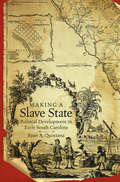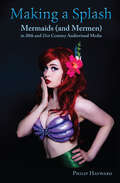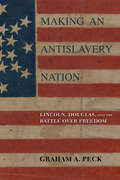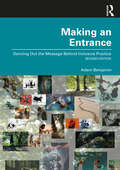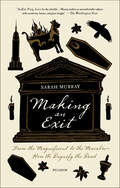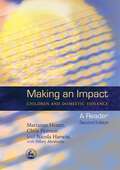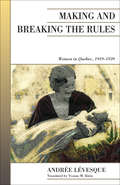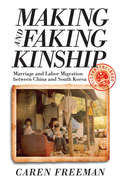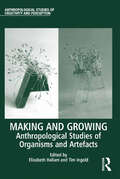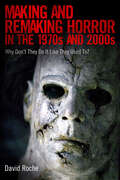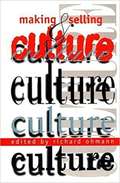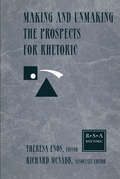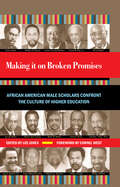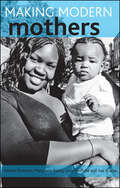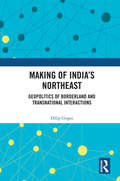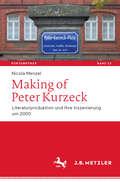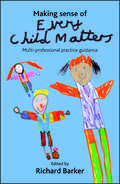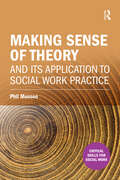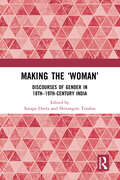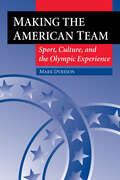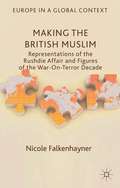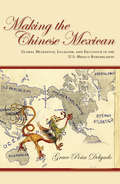- Table View
- List View
Making a Slave State: Political Development in Early South Carolina
by Ryan A. QuintanaHow is the state produced? In what ways did enslaved African Americans shape modern governing practices? Ryan A. Quintana provocatively answers these questions by focusing on the everyday production of South Carolina's state space—its roads and canals, borders and boundaries, public buildings and military fortifications. Beginning in the early eighteenth century and moving through the post–War of 1812 internal improvements boom, Quintana highlights the surprising ways enslaved men and women sat at the center of South Carolina's earliest political development, materially producing the state's infrastructure and early governing practices, while also challenging and reshaping both through their day-to-day movements, from the mundane to the rebellious. Focusing on slaves' lives and labors, Quintana illuminates how black South Carolinians not only created the early state but also established their own extralegal economic sites, social and cultural havens, and independent communities along South Carolina's roads, rivers, and canals.Combining social history, the study of American politics, and critical geography, Quintana reframes our ideas of early American political development, illuminates the material production of space, and reveals the central role of slaves' daily movements (for their owners and themselves) to the development of the modern state.
Making a Splash: Mermaids (and Mermen) in 20th and 21st Century Audiovisual Media
by Philip HaywardThe representation of aquatic people in contemporary film and television—from their on-screen sexuality to the mockumentaries they’ve inspired.Mermaids have been a feature of western cinema since its inception and the number of films, television series, and videos representing them has expanded exponentially since the 1980s. Making a Splash analyses texts produced within a variety of audiovisual genres. Following an overview of mermaids in western culture that draws on a range of disciplines including media studies, psychoanalysis, and post-structuralism, individual chapters provide case studies of particular engagements with the folkloric figure. From Hans Christian Andersen’s “The Little Mermaid” to the creation of Ursula, Ariel’s tentacled antagonist in Disney’s 1989 film, to aspects of mermaid vocality, physicality, agency, and sexuality in films and even representations of mermen, this work provides a definitive overview of the significance of these ancient mythical figures in 110 years of western audio-visual media.
Making a Way Out of No Way: Lives of Labor, Love, and Resistance
by Merideth M. TaylorA richly imagined, photo illustrated narrative of 150 years of life in slavery on tobacco plantations in Southern MarylandFor over 165 years, plantation owners in Southern Maryland depended on the labor of enslaved men, women, and children to bring in the tobacco crop. The photographs and stories in this book grew out of the author’s quest to understand how these people, who were subjected to a system that made every attempt to brutalize and dehumanize them, were able not only to survive but to build families and meaningful lives. Author Merideth Taylor has created a credible, well-researched, richly imagined world that is both informative and moving. The traditional central figure and linear plot of the novel has been replaced by an interwoven collage of scenes and community of characters, that reflect the diversity of experience, “silences,” and incompleteness of the historical record. Her choice to largely avoid graphic depictions of the violence perpetrated on enslaved bodies allows the reader to focus, instead, on the remarkable resilience, ingenuity, skills, and cultural strengths that enabled them to make a way out of no way. Author royalties will be donated to Historic Sotterley’s Descendant’s Project.
Making an Antislavery Nation: Lincoln, Douglas, and the Battle over Freedom
by Graham A. PeckThis sweeping narrative presents an original and compelling explanation for the triumph of the antislavery movement in the United States prior to the Civil War. Abraham Lincoln's election as the first antislavery president was hardly preordained. From the country's inception, Americans had struggled to define slavery's relationship to freedom. Most Northerners supported abolition in the North but condoned slavery in the South, while most Southerners denounced abolition and asserted slavery's compatibility with whites' freedom. On this massive political fault line hinged the fate of the nation. Graham A. Peck meticulously traces the conflict over slavery in Illinois from the Northwest Ordinance in 1787 to Lincoln's defeat of his arch-rival Stephen A. Douglas in the 1860 election. Douglas's attempt in 1854 to persuade Northerners that slavery and freedom had equal national standing stirred a political earthquake that brought Lincoln to the White House. Yet Lincoln's framing of the antislavery movement as a conservative return to the country's founding principles masked what was in fact a radical and unprecedented antislavery nationalism. It justified slavery's destruction but triggered Civil War. Presenting pathbreaking interpretations of Lincoln, Douglas, and the Civil War's origins, Making an Antislavery Nation shows how battles over slavery paved the way for freedom's triumph in America.
Making an Entrance: Dancing Out the Message Behind Inclusive Practice
by Adam BenjaminThis second edition of Making an Entrance is a practical and thought-provoking introduction to teaching dance with disabled and non-disabled students, updated with expanded coverage, new and revised exercises, and chapters that cover post-pandemic and online practice, diversity and inclusivity. With improvisation as his central concern Benjamin covers an extensive range of topics, including new autoethnographic writing, mental health, performance, feedback, and The Dancers’ Forest, and interrogates what we mean when we talk about ‘inclusive’ and ‘integrated dance.’ There are over 50 stimulating and challenging exercises purposefully designed for dance students of all levels accompanied by teaching notes, and examples drawn from the author’s experience as a teacher, performer, and dance maker. Useful hints are provided on the practicalities of setting up workshops covering issues such as class sizes, the safety aspects of wheelchairs and accessibility. An essential read for both students and teachers of improvisation who are seeking ways to engage with issues of diversity, written to be accessible whilst offering areas of increasing complexity and challenge for more experienced practitioners.
Making an Exit: From the Magnificent to the Macabre—How We Dignify the Dead
by Sarah MurrayThoughtful, amusing, and provocative, Making an Exit will transform the way you look at life's last passage. Because, as Murray discovers, death is, for many, not an ending but the start of something new.Author and journalist Sarah Murray never gave much thought to what might ultimately happen to her remains—that was, until her father died. While he'd always insisted that the "organic matter" left after a person takes their last breath had no significance, he surprised his family by setting down elaborate arrangements for the scattering of his own ashes. This unexpected last request prompted Murray to embark on a series of voyages to discover how our end is commemorated around the globe—and how we approach our own mortality.Spanning continents and centuries, Making an Exit is Murray's exploration of the extraordinary creativity unleashed when we seek to dignify the dead. Along the way, she encounters a cremation in Bali in which two royal personages are placed in giant decorative bulls and consigned to the afterlife in a burst of flames; a chandelier in the Czech Republic made entirely from human bones; a weeping ceremony in Iran; and a Philippine village where the casketed dead are left hanging in caves. She even goes to Ghana to commission her own fantasy coffin. The accounts of these journeys are fascinating, poignant, and funny. But this is also a very personal quest: on her travels, Murray is seeking inspiration for her own eventual send-off.
Making an Impact - Children and Domestic Violence: A Reader
by Hilary Abrahams Marianne Hester Nicola Harwin Chris PearsonThis fully updated Reader provides a comprehensive review of recent research and legislation relating to domestic violence and its consequences for children, and identifies the implications for practice. It is divided into three parts. Part One describes evidence for the links between domestic violence and the concomitant abuse of children and assesses the effects on children's future well-being. Part Two is a comprehensive and accessible guide to relevant current criminal and civil legislation. Highlighting the success of multi-agency approaches, the final part details practical issues for interventions with children and their carers, male perpetrators, and, new to this edition, women. Endorsed by children's charities including the NSPCC and Barnardo's, Making an Impact enables professionals working with children to develop informed, sophisticated and collaborative child care and protection responses for children who are experiencing domestic violence.
Making and Breaking the Rules
by Yvonne M. Klein Andree LevesqueDuring the interwar period, Quebec was a strongly patriarchal society, where men in the Church, politics, and medicine, maintained a traditional norm of social and sexual standards that women were expected to abide by. Some women in the media and religious communities were complicit with this vision, upholding the "ideal" as the norm and tending to those "deviants" who failed to meet society's expectations. By examining the underside of a staid and repressive society, Andrée Lévesque reveals an alternate and more accurate history of women and sexual politics in early twentieth-century Quebec. Women, mainly of the working class, left traces in the historical record of their transgressions from the norm, including the rejection of motherhood (e.g., abortion, abandonment, infanticide), pregnancy and birth outside of marriage, and prostitution. Professor Lévesque concludes, "They were deviant, but only in relation to a norm upheld to stave off a modernism that threatened to swallow up a Quebec based on long-established social and sexual roles."
Making and Faking Kinship: Marriage and Labor Migration between China and South Korea
by Caren FreemanIn the years leading up to and directly following rapprochement with China in 1992, the South Korean government looked to ethnic Korean (Chosǒnjok) brides and laborers from northeastern China to restore productivity to its industries and countryside. South Korean officials and the media celebrated these overtures not only as a pragmatic solution to population problems but also as a patriotic project of reuniting ethnic Koreans after nearly fifty years of Cold War separation. As Caren Freeman's fieldwork in China and South Korea shows, the attempt to bridge the geopolitical divide in the name of Korean kinship proved more difficult than any of the parties involved could have imagined. Discriminatory treatment, artificially suppressed wages, clashing gender logics, and the criminalization of so-called runaway brides and undocumented workers tarnished the myth of ethnic homogeneity and exposed the contradictions at the heart of South Korea’s transnational kin-making project. Unlike migrant brides who could acquire citizenship, migrant workers were denied the rights of long-term settlement, and stringent quotas restricted their entry. As a result, many Chosǒnjok migrants arranged paper marriages and fabricated familial ties to South Korean citizens to bypass the state apparatus of border control. Making and Faking Kinship depicts acts of "counterfeit kinship," false documents, and the leaving behind of spouses and children as strategies implemented by disenfranchised people to gain mobility within the region’s changing political economy.
Making and Growing: Anthropological Studies of Organisms and Artefacts (Anthropological Studies of Creativity and Perception)
by Elizabeth Hallam Tim IngoldMaking and Growing brings together the latest work in the fields of anthropology and material culture studies to explore the differences - and the relation - between making things and growing things, and between things that are made and things that grow. Though the former are often regarded as artefacts and the latter as organisms, the book calls this distinction into question, examining the implications for our understanding of materials, design and creativity. Grounding their arguments in case studies from different regions and historical periods, the contributors to this volume show how making and growing give rise to co-produced and mutually modifying organisms and artefacts, including human persons. They attend to the properties of materials and to the forms of knowledge and sensory experience involved in these processes, and explore the dynamics of making and undoing, growing and decomposition. The book will be of broad interest to scholars in the fields of anthropology, archaeology, material culture studies, history and sociology.
Making and Remaking Horror in the 1970s and 2000s: Why Don't They Do It Like They Used To?
by David RocheIn Making and Remaking Horror in the 1970s and 2000s author David Roche takes up the assumption shared by many fans and scholars that original horror movies are more “disturbing,” and thus better than the remakes. He assesses the qualities of movies, old and recast, according to criteria that include subtext, originality, and cohesion. With a methodology that combines a formalist and cultural studies approach, Roche sifts aspects of the American horror movie that have been widely addressed (class, the patriarchal family, gender, and the opposition between terror and horror) and those that have been somewhat neglected (race, the Gothic, style, and verisimilitude). Containing seventy-eight black-and-white illustrations, the book is grounded in a close comparative analysis of the politics and aesthetics of four of the most significant independent American horror movies of the 1970s—The Texas Chain Saw Massacre, The Hills Have Eyes, Dawn of the Dead, and Halloween—and their twenty-first-century remakes. To what extent can the politics of these films be described as “disturbing” insomuch as they promote subversive subtexts that undermine essentialist perspectives? Do the politics of the film lie on the surface or are they wedded to the film's aesthetics? Early in the book, Roche explores historical contexts, aspects of identity (race, ethnicity, and class), and the structuring role played by the motif of the American nuclear family. He then asks to what extent these films disrupt genre expectations and attempt to provoke emotions of dread, terror, and horror through their representations of the monstrous and the formal strategies employed? In this inquiry, he examines definitions of the genre and its metafictional nature. Roche ends with a meditation on the extent to which the technical limitations of the horror films of the 1970s actually contribute to this “disturbing” quality. Moving far beyond the genre itself, Making and Remaking Horror studies the redux as a form of adaptation and enables a more complete discussion of the evolution of horror in contemporary American cinema.
Making and Selling Culture
by Richard M. OhmannAn in depth look at how culture and marketing play off each other.
Making and Unmaking the Prospects for Rhetoric: Selected Papers From the 1996 Rhetoric Society of America Conference
by Carolyn Miller Roxanne Mountford Theresa Enos Richard McNabbThe 1996 Meeting of the Rhetoric Society of America commemorated the 25th anniversary of the publication of Lloyd Bitzer and Edwin Black's The Prospect of Rhetoric. In so doing, the conference gave scholars and teachers in various disciplines from all over the country the opportunity to talk about new prospects for rhetoric. The conferees were asked to present their vision of rhetoric studies or to demonstrate what rhetoric studies could be by example. Their essays, presented in this volume, illustrate a discipline at odds over the future and demonstrate the continued influence and vitality of other papers, on the same subject, published some 25 years ago.
Making it Home: Place in Canadian Literature
by Deborah KeaheyTraditional approaches to Prairie literature have focussed on the significance of "the land" in attempts to make a place into a home. The emphasis on the importance of landscape as a defining feature ignores the important roles played by other influences brought to the land such as history, culture, gender, ethnicity, religion, community, family, and occupation. Deborah Keahey considers over 70 years of Canadian Prairie literature, including poetry, autobiography, drama, and fiction. The 17 writers range from the well-established, like Martha Ostenso and Robert Kroetsch, to newer writers, like Ian Ross and Kelly Rebar. Through their works, she asks whether the Prairies are a physical or a political creation, whether "home" is made by what you bring with you, or what you find when you arrive, and she incorporates the influences and effects far beyond landscape to understand what guides the "home-making" process of both the writers and their creations. Her study acknowledges that "home" is a complicated concept, and making a place into a home place is a complicated process. Informed by current linguistic, feminist, postcolonial, and cultural theory, Keahey explores these concepts in depth and redefines our understanding of place, home, and the relationship between them.
Making it on Broken Promises
by Cornel West Lee Jones"This book provides an occasion to examine the complex conjuncture between the White supremacist realities of the American Academy and the often threatening presence of brilliant Black men in the Academy. This challenging book should also serve as an inspiration for a new generation of Black men deeply devoted to the life of the mind in or outside the Academy." —From the foreward by Cornel West.Sixteen of America's leading scholars offer an uncompromising critique of the academy from their perspective as African American men. They challenge dominant majority assumptions about the culture of higher education, most particularly its claims of openness to diversity and divergent traditions.They take issue with the processes that determine what is legitimized as scholarship, as well as with who wields the power to authenticate it. They describe the debilitating pressures to subordinate Black identity to a supposedly universal but hegemonic Eurocentric culture. They question the academy's valuing of individuality and its privileging of dichotomy over their cultural styles of community, humanism and synthesis. They also range over such issues as culturally mediated styles of cognition, the misuse of standardized testing, the disproportionate burden of service placed on African American faculty and a reward system that discounts it.
Making modern mothers
by Rachel Thomson Mary Jane KehilyWhat does motherhood mean today? Drawing on interviews with new mothers and intergenerational chains of women in the same family, this exciting and timely book documents the transition to motherhood over generations and time. Exploring, amongst other things, the trend to later motherhood and the experience of teenage pregnancy, a compelling picture emerges. Becoming a mother is not only a profound moment of identity change but also a site of socio-economic difference that shapes women's lives.
Making of India's Northeast: Geopolitics of Borderland and Transnational Interactions
by Dilip GogoiThis book examines India’s Northeast borderland – strategically positioned at the confluence of South Asia, East and Southeast Asia – from the perspective of international relations. The volume interrogates the geopolitics of region-making in both colonial and postcolonial times and traces the transformation of Northeast India from a British strategic frontier into a securitised borderland. It situates the region in transnational interactions both in conflict and cooperation with its immediate neighbouring regions of China, Bangladesh, and Myanmar, especially in the context of India’s Look East/Act East policy. The volume paves the way for a new ‘region-state’ framework borne out of the constructivist worldview and offers answers to many conundrums centring border studies. It further delineates approaches to overcoming the present geopolitical and territorial challenges of India’s Northeast with a critical thrust on regional policymaking. The volume will be of interest to students and researchers in the disciplines of social sciences and humanities in India as well as South and Southeast Asia. It will be especially useful to those in politics and international relations, strategic studies, international political economy, foreign policy, development studies and regional development, besides foreign policy-makers and diplomats, development practitioners, economists and policy analysts.
Making of Peter Kurzeck: Literaturproduktion und ihre Inszenierung um 2000 (Kontemporär. Schriften zur deutschsprachigen Gegenwartsliteratur #22)
by Nicola MenzelDie Studie untersucht die öffentliche Darstellung des Schreibprozesses Peter Kurzecks. Seine mehrbändige autofiktionale Romanreihe Das alte Jahrhundert sowie seine frei eingesprochenen Hörbücher wurden im Feuilleton einhellig als außergewöhnlich besprochen. Sie gelten als authentische Rarität in einem sich ansonsten zunehmend popularisierendem Literaturbetrieb. Die Arbeit zeigt hingegen, dass das Phänomen Kurzeck keinesfalls abseits eines ökonomisierten und medialisierten gegenwartskulturellen Feldes steht. Vielmehr lassen sich typische populäre und ökonomische Mechanismen ablesen wie u.a. Mehrfachadressierung, Zweitverwertung, Serialität und Fankultur. Auch das Phänomen Kurzeck selbst wirkt auf das Feld ein, von dem es sich abzusondern scheint, und zwar nicht trotz des autonomieästhetischen Gestus, sondern gerade deswegen. Kurzeck wird mithin als gegenwartsästhetisches Phänomen untersucht, bei dem Marktdistinktion zum Verkaufsargument wird.Exemplarisch an Kurzeck wird gezeigt, dass sich Formationen des gegenwartskulturellen Feldes um 2000 auch dort ablesen lassen, wo sie nicht erwartet werden. Die Arbeit regt dazu an, einen emphatischen Literaturbegriff als grundsätzlich produzierbar und konsumierbar zu verstehen, mit Blick auf Kurzeck als werkpolitischer Effekt der Selbst- und Schreibdarstellung einer Autorfigur. Als Beitrag zur Gegenwartsliteraturforschung regt sie darüber hinaus zur Reflexion der literaturwissenschaftlichen Haltung gegenüber ihrem Gegenstand und den eigenen Forschungspraktiken an.Methodisch verbindet sie feldtheoretische Fragen mit close readings nicht nur literarischer Texte und ihrer Vorarbeiten aus dem Nachlass Kurzecks, sondern auch von Interviews, Preisreden, Videoaufnahmen von Lesungen, einem öffentlichen Manuskriptdiktat im Frankfurter Literaturhaus sowie der Peter-Kurzeck-App. Das dafür entwickelte umfassende methodische Modell stellt einen generellen Vorschlag dar zur Analyse gegenwartsliterarischer Gegenstände, bei der literaturwissenschaftliche Methoden mit ökonomischen, paratextuellen, soziologischen, praxeologischen und kulturästhetischen Aspekten im Dialog stehen.
Making sense of Every Child Matters: Multi-professional practice guidance
by Richard BarkerThis much-needed book examines the implications of the 'Every Child Matters' (ECM) national and local framework for working with children. It analyses the key issues from the perspective of the different professions that make up the 'new children's workforce' and explores interprofessional considerations. The book includes practice issues and case examples from health, education, social work, playwork, children's centres and early years, and considers the opportunities and challenges presented by the current agenda. It will be widely welcomed by tutors and practitioners alike, enabling readers to make sense of the legislation and national guidance, and to understand better the new agendas for children's services. For more information visit: http://www.everychildmattersbook.co.uk/
Making sense of theory and its application to social work practice
by Phil MussonDo you struggle to get your head around the application of theory and associated methods of intervention to social work practice? Making sense of theory and its application to social work practice is here to help you with a fresh approach written with the ‘non- theoretician’ in mind. After exploring the expectations and limits of application of theory to practice, Phil Musson sets about describing theories of explanation and their associated methods of intervention in an accessible way. He follows this by looking at theoretically driven approaches and their associated methods of intervention. One generic case study is used throughout, tweaked slightly but maintaining the same service users and issues so you can see how the theory of explanation or approach and the associated method of intervention is applied. You are also able to sharpen up your critical thinking skills as the author invites you to reflect on the theories of explanation and approaches discussed.Making Sense of Theory and its Application to Social Work Practice will be immensely valuable to both social work students and practitioners.
Making the 'Woman': Discourses of Gender in 18th-19th century India
by Sutapa Dutta Shivangini TandonThe book examines the representation of women, their agency and subjectivity and gender relations in 18th- and 19th-century India. The chapters in the volume interrogate notions and discourses of ‘women’ and ‘gender’ during the period, historically shaped by multiple and even competing actors, practices and institutions. They highlight the ‘making of the woman’ across a wide spectrum of subject areas, regions and roles and attempt to understand the contradictions and differences in social experiences and identity formations of women. The volume also deals with prevalent notions of masculinity and femininity, normative and non-conformist expressions of gender and sexual identity and epistemological concerns of gender, especially in its intersectional interplay with other axes of caste, class, race, region and empire. Presenting unique understandings of our gendered pasts, this volume will be of great interest to scholars and researchers of history, gender studies and South Asian studies.
Making the American Team: Sport, Culture, and the Olympic Experience (Sport and Society)
by Mark DyresonSport dominates television and the mass media. Politics and business are a-bustle with sports metaphors. Endorsements by athletes sell us products. "Home run," "slam dunk," and the rest of the vocabulary of sport color daily conversation. Even in times of crisis and emergency, the media reports the scores and highlights. Marky Dyreson delves into how our obsession with sport came into being with a close look at coverage of the Olympic Games between 1896 and 1912. How people reported and consumed information on the Olympics offers insight into how sport entered the heart of American culture as part of an impetus for social reform. Political leaders came to believe in the power of sport to revitalize the "republican experiment." Sport could instill a new sense of national identity that would forge a new sense of community and a healthy political order while at the same time linking America's intellectual and power elite with the experiences of the masses.
Making the British Muslim
by Nicole FalkenhaynerTracing representations of the Rushdie affair from 1989 to 2009, this study establishes a genealogy of how British Muslims appeared on the public scene and how an imaginary and politics of this subject position developed.
Making the Carry: The Lives of John and Tchi-Ki-Wis Linklater
by Timothy CochraneAn extraordinary illustrated biography of a Métis man and Anishinaabe woman navigating great changes in their homeland along the U.S.–Canada border in the early twentieth century John Linklater, of Anishinaabeg, Cree, and Scottish ancestry, and his wife, Tchi-Ki-Wis, of the Lac La Croix First Nation, lived in the canoe and border country of Ontario and Minnesota from the 1870s until the 1930s. During that time, the couple experienced radical upheavals in the Quetico–Superior region, including the cutting of white and red pine forests, the creation of Indian reserves/reservations and conservation areas, and the rise of towns, tourism, and mining. With broad geographical sweep, historical significance, and biographical depth, Making the Carry tells their story, overlooked for far too long.John Linklater, a renowned game warden and skilled woodsman, was also the bearer of traditional ecological knowledge and Indigenous heritage, both of which he was deeply committed to teaching others. He was sought by professors, newspaper reporters, museum personnel, and conservationists—among them Sigurd Olson, who considered Linklater a mentor. Tchi-Ki-Wis, an extraordinary craftswoman, made a sweeping array of necessary yet beautiful objects, from sled dog harnesses to moose calls to birch bark canoes. She was an expert weaver of large Anishinaabeg cedar bark mats with complicated geometric designs, a virtually lost art.Making the Carry traces the routes by which the couple came to live on Basswood Lake on the international border. John&’s Métis ancestors with deep Hudson&’s Bay Company roots originally came from Orkney Islands, Scotland, by way of Hudson Bay and Red River, or what is now Winnipeg. His family lived in Manitoba, northwest Ontario, northern Minnesota, and, in the case ofJohn and Tchi-Ki-Wis, on Isle Royale. A journey through little-known Canadian history, the book provides an intimate portrait of Métis people.Complete with rarely seen photographs of activities from dog mushing to guiding to lumbering, as well as of many objects made by Tchi-Ki-Wis, such as canoes, moccasins, and cedar mats, Making the Carry is a window on a traditional way of life and a restoration of two fascinating Indigenous people to their rightful place in our collective past.
Making the Chinese Mexican: Global Migration, Localism, and Exclusion in the U.S.-Mexico Borderlands
by Grace Peña DelgadoMaking the Chinese Mexicanis the first book to examine the Chinese diaspora in the U. S. -Mexico borderlands. It presents a fresh perspective on immigration, nationalism, and racism through the experiences of Chinese migrants in the region during the late nineteenth and early twentieth centuries. Navigating the interlocking global and local systems of migration that underlay Chinese borderlands communities, the author situates the often-paradoxical existence of these communities within the turbulence of exclusionary nationalisms. The world of Chinesefronterizos(borderlanders) was shaped by the convergence of trans-Pacific networks and local arrangements: against a backdrop of national unrest in Mexico and in the era of exclusionary immigration policies in the United States, Chinesefronterizoscarved out vibrant, enduring communities that provided a buffer against virulent Sinophobia. This book challenges us to reexamine the complexities of nation-making, identity formation, and the meaning of citizenship. It represents an essential contribution to our understanding of the U. S. -Mexico borderlands.
